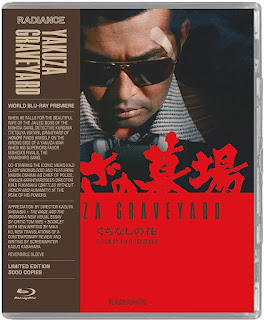Yakuza Graveyard
Although Turner Classic Movies catches a lot of flak for its programming quirks, it’s still an important cinematic resource, one that gives a bit of pomp and circumstance to even the most insignificant films. And their host introductions, usually a five minute or less breakdown of the most salient facts and figures, are a big part of the experience. On the home video side of things, liner notes serve the same function. The best of them provides some backstory and historical significance rather than just shamelessly plugging something you’ve already bought. And on Radiance Films latest release, Yakuza Graveyard (1976), those notes are an essential part of appreciating just what the film is trying to accomplish.
Kuroiwa is a police investigator with a chip on his shoulder. Charged with keeping the peace between warring yakuza clans, he finds himself drawn to their honor-code that seems a step up from his own corrupt police force. In particular, his association with the Nishida clan develops into a respectful relationship with its acting head, Iwata, and a romantic one with Keiko, the prison-widow of its former leader. As the battle reaches a tipping point, Kuroiwa must choose between the rule of law and the bond of brotherhood.
Yakuza Graveyard is ostensibly just a footnote in director Kinji Fukasaku’s more epic Battles Without Honor and Humanity series. Only it’s not. It’s a much more accessible and emotional film than any of his previous collaborations with screenwriter Kazuo Kasahara, one that encapsulates the themes of post-war poverty, ambition and social ties better than anything that came before. Yeah, it’s that good.
Fukasaku delivers the same chaotic energy, tossing his camera carelessly into the middle of the action scenes. And even the cop-yakuza-lover triangle scenario is nothing new. But, as explained in the aforementioned liner notes, the focus this time is on outsiders to traditional Japanese society. Iwata and Keiko are zainichi Koreans, generational holdovers from Japan’s colonial period who are viewed as second-class citizens at best. And Kuroiwa, whose attempts at a promotion have always been thwarted, is a Manchurian, born in China and repatriated after the war. In a very real sense, they are fighting a battle on both sides, minorities even within their tight-knit criminal world.
That might seem like a small deviation from the yakuza formula. But it makes a big difference in the film’s approach. Yakuza Graveyard feels more human and more adult; every twist, turn and betrayal has emotional repercussions. Kasahara’s script keeps his characters on a tight leash, circling a finale that seems tragically unavoidable despite their best attempts to escape the current. And that cultural leap turns what would have been an otherwise typical crime saga into something much more significant. This is a film you want to stand up and tell the world about.
Radiance Film’s limited-edition Blu-ray (only 3000 copies) comes with a visual essay by critic Tom Mes of co-star Meiko Jaji and Fukasaku’s other collaborations, another appreciation by filmmaker Kazuya Shiraishi, promotional material and the aforementioned collector’s booklet.




Comments
Post a Comment